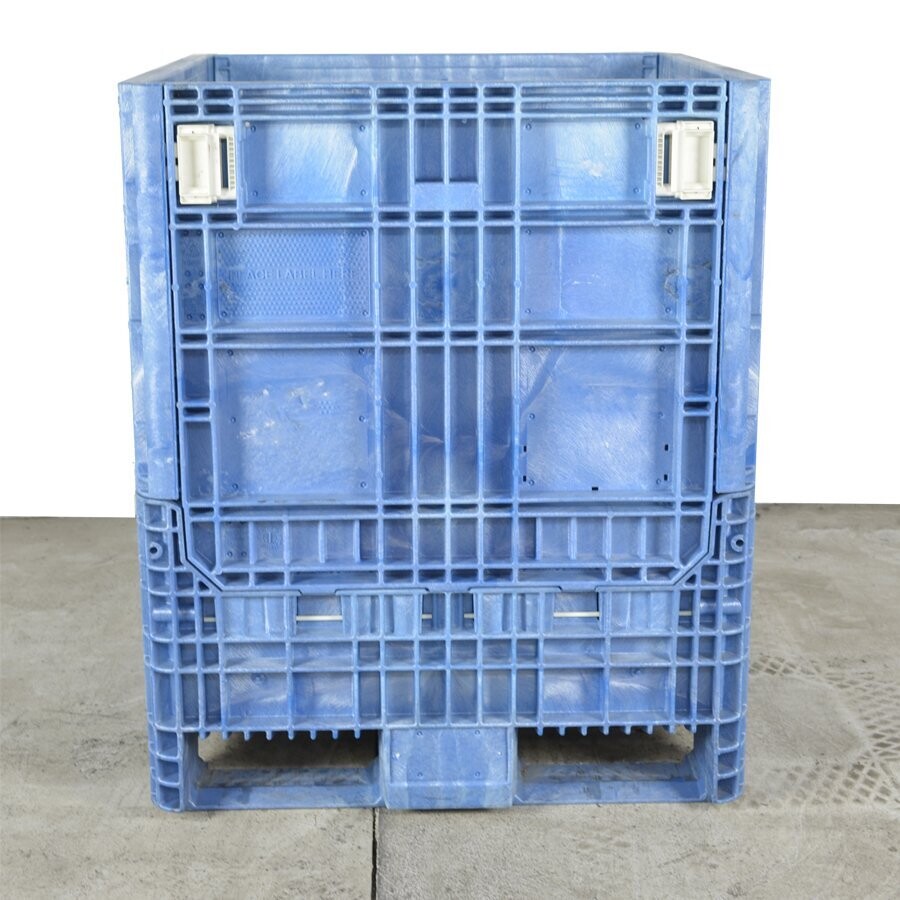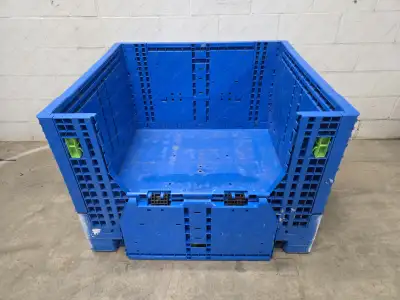Compare refurbished bulk containers and used bulk containers for practical solutions
Wiki Article
The Ultimate Guide to Picking the Right Bulk Containers for Your Organization Requirements
Picking the suitable mass containers is vital for any kind of business that depends on efficient logistics. Various types of containers exist, each created for certain products and applications. Variables such as dimension, product compatibility, and governing criteria play a significant role in this decision-making procedure. Comprehending these aspects can bring about enhanced operational efficiency. Nevertheless, several organizations ignore essential facets that could improve their total efficiency and sustainability. What are these factors to consider?Comprehending Various Sorts Of Mass Containers
Mass containers function as essential devices for services seeking efficient storage and transportation options. These containers are available in numerous kinds, each developed to fulfill specific operational demands. One typical kind is the intermediate bulk container (IBC), which is optimal for fluid and granulated products, supplying an equilibrium of capability and maneuverability. An additional prominent option is the mass bag, or FIBC, ideal for completely dry, flowable products. These adaptable containers are light-weight and can be conveniently delivered and kept. For heavier materials, stiff mass containers are often used, giving durability and stability for secure handling. Additionally, there are customized containers customized for harmful products, making certain conformity with safety policies. Recognizing the distinct qualities of these mass container kinds permits organizations to make informed decisions that enhance logistics and minimize prices. By picking the ideal container, firms can boost their functional effectiveness and enhance their supply chain procedures.Trick Material Considerations for Mass Containers
When picking bulk containers, it is vital to ponder the products used in their construction. Factors such as resilience, stamina, and chemical compatibility play a vital role in making certain the containers fulfill specific functional needs. In addition, weight and mobility worries can influence both efficiency and transportation logistics.Product Toughness and Stamina
Longevity and toughness are vital consider picking products for bulk containers, as they directly affect the container's capacity to endure various ecological problems and taking care of procedures. Products such as high-density polyethylene (HDPE), polypropylene, and stainless-steel are generally favored for their robust residential or commercial properties, supplying resistance to abrasion, temperature level, and effect fluctuations. The selection of product additionally affects the general life expectancy of the container; stronger products normally cause much less constant substitutes, bring about cost financial savings with time. Furthermore, the weight of the material can affect delivery prices and simplicity of handling. Businesses should consider their specific operational settings and the potential for wear and tear to guarantee peak resilience and toughness in their bulk container selection.Chemical Compatibility Elements
Understanding chemical compatibility is essential for choosing bulk containers, as the materials used need to stand up to the particular compounds they will certainly hold. Different elements influence compatibility, including the chemical nature of the contents, temperature level, and duration of storage. Harsh chemicals might require containers made from stainless steel or specialized plastics that resist destruction. Additionally, responsive compounds can produce warm or gases, requiring vented or pressure-rated containers. The selection of container material, whether metal, polycarbonate, or polyethylene, should line up with the chemical residential properties of the kept substances to stop leakages or violations. Eventually, a detailed assessment of these compatibility variables assures risk-free handling and storage space, safeguarding both employees and the environment while preserving item honesty.Weight and Portability Worries
Selecting bulk containers entails not only evaluating chemical compatibility however likewise considering weight and transportability. Businesses need to examine the ease of handling and transport to optimize efficiency. Light-weight products like high-density polyethylene (HDPE) or aluminum can promote less complicated activity and lower delivery prices. Conversely, heavier containers may provide improved toughness however can hinder wheelchair, particularly in environments calling for regular moving. Furthermore, the layout of the container should permit for practical training and stacking, guaranteeing ergonomic safety for workers. Business need to additionally consider the framework offered for transport; for instance, containers compatible with forklifts or pallet jacks can simplify procedures. Ultimately, the ideal equilibrium in between weight and portability straight affects operational effectiveness and cost efficiency.Sizing Your Mass Containers for Ideal Performance
When sizing mass containers, companies have to thoroughly evaluate the measurements called for to fit their particular products. Furthermore, weight ability is an important factor that influences efficiency and security throughout transport and storage. Efficient sizing not only takes full advantage of room but additionally enhances functional workflows.Establishing Container Dimensions
Choosing the right measurements for bulk containers is vital for taking full advantage of performance in storage and transportation. Businesses have to analyze their particular needs, taking right into account factors such as offered area, the nature of the items being kept, and the approaches of transport used. Accurate dimensions guarantee that containers fit ideally in lorries and storehouses, minimizing wasted area and minimizing taking care of time. Requirement dimensions can use benefit, yet custom dimensions could be essential for special needs or to accommodate certain items. Furthermore, it is very important to examine piling capabilities and ease of access, as these factors affect overall operational performance. Inevitably, the best dimensions result in boosted organization and streamlined logistics, profiting the general performance of business.Weight Ability Considerations
Comprehending weight capability is crucial for services aiming to maximize their mass container performance. The weight capability of a container directly influences storage space capacities, transportation logistics, and total operational prices. Selecting containers with the ideal weight limits ensures that services can securely keep and carry their products without running the risk of damages or compliance problems. Overloading containers can result in structural failings, while underutilizing ability lead to wasted sources. When choosing containers, it is crucial for services to analyze their product weights and take into consideration any regulative demands. Additionally, elements such as the sort of product, intended usage, and ecological conditions need to also influence weight ability decisions. By reviewing these elements, companies can enhance efficiency and ensure a structured supply chain.Governing Compliance and Safety Requirements

Regulatory conformity and security standards play an important role in the choice of mass containers for companies. Organizations needs to ensure that their containers meet numerous guidelines established by local, national, and international authorities. These criteria commonly refer to material security, structural integrity, and correct labeling, which aid protect against mishaps and ensure the secure transportation of goods.
Furthermore, adherence to industry-specific standards, such as those from the Food and Medicine Administration (FDA) or the Occupational Safety And Security and Health Management (OSHA), is critical for firms taking care of harmful materials or foodstuff. Non-compliance can cause penalties, legal issues, or damage to a service's credibility.
Businesses need to also take into consideration the container's compatibility with the materials being stored or moved to stay clear of contamination or chain reaction (used collapsible bulk containers). To summarize, recognizing and applying regulative conformity and safety and security standards is vital for the efficient and liable use bulk containers
Sustainability Options for Eco-Friendly Mass Containers

Business are likewise discovering choices made from recycled materials, which not just save resources yet additionally sustain the reusing sector. Additionally, technologies in style allow for lighter containers that call for less energy to transportation, better boosting sustainability. By integrating these green mass container alternatives, companies can show their dedication to ecological stewardship while satisfying consumer demand for sustainable practices. This change not only helps the world but can also improve brand name track record and consumer commitment.
Cost-Effectiveness and Budgeting for Bulk Containers
While numerous services concentrate on sustainability, cost-effectiveness remains a crucial variable when picking bulk containers. Organizations needs to evaluate the preliminary acquisition cost, along with long-term functional prices, to guarantee monetary viability. Elements such as reusability, durability, and upkeep play a substantial duty in identifying total costs.Purchasing high-quality containers may generate greater upfront expenses yet can result in cost savings with reduced replacement prices and reduced waste. Furthermore, organizations ought to consider transport prices and storage performance, as these can influence the overall budget.

Often Asked Concerns
Just how Do I Identify the Right Container for Hazardous Materials?
To figure out the appropriate container for unsafe products, one must review compatibility with the material, take into consideration check here the container's material, look for regulative conformity, and analyze capability and safety functions to assure appropriate handling and storage space.Can Bulk Containers Be Personalized for Particular Products?
Yes, bulk containers can be customized for particular products. used bulk containers. Numerous attributes, such as size, product, and design, can be tailored to satisfy special requirements, guaranteeing suitable safety and security and efficiency for carrying and storing different productsWhat Is the Typical Lifespan of Various Mass Container Types?
The ordinary life-span of bulk container kinds varies; plastic containers last 5-10 years, steel containers 10-20 years, and wood containers normally last 3-7 years, relying on use, upkeep, and environmental conditions.Just how Should I Tidy and Maintain Mass Containers?
To cleanse and maintain bulk containers, one should regularly inspect for damage, remove residue, wash with ideal detergents, wash extensively, and warranty correct drying out before storage. Following manufacturer standards boosts longevity and safety during usage.Are There Rental Options for Mass Containers Available?
Yes, countless firms provide rental options for bulk containers, giving flexibility for organizations. These rentals can suit various demands, permitting companies to manage supply effectively without the commitment of buying containers outright.Durability and stamina are critical elements in picking materials for mass containers, as they straight affect the container's ability to hold up against different environmental conditions and managing procedures. Comprehending chemical compatibility is essential for selecting mass containers, as the materials made use of have to stand up to the particular materials they will certainly hold. Comprehending weight ability is essential for companies aiming to enhance their mass container effectiveness. Regulative conformity and security criteria play an important role in the option of mass containers for companies. While many companies focus on sustainability, cost-effectiveness continues to be a crucial factor when choosing bulk containers.
Report this wiki page